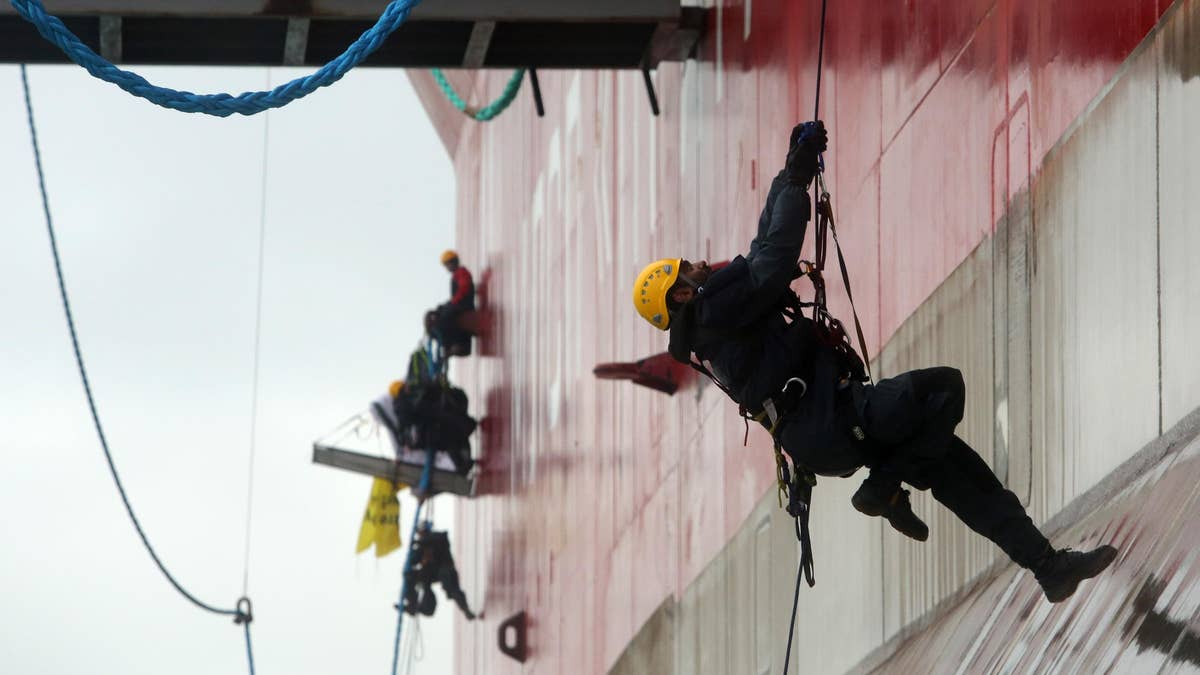
Greenpeace activists including Executive Director of Greenpeace International, Kumi Naidoo, board energy giant Gazprom's Arctic oil platform Prirazlomnaya off the North-eastern coast of Russia in the Pechora Sea on Friday, Aug. 24, 2012. Greenpeace activists have stormed a floating oil rig in Russias Pechora Sea to protest oil drilling in the Arctic, the environmental organization said on Friday. (AP Photo/ Denis Sinyakov, Greenpeace) (AP2012)
MOSCOW – Greenpeace activists were first offered hot soup, then sprayed with blasts of cold water after they stormed a floating Russia oil platform and erected climbing tents on the side of the rig Friday to protest drilling in the Arctic.
The six activists, who include Greenpeace executive director Kumi Naidoo, were hanging off the side of the Prirazlomnaya platform in the Pechora Sea -- attached to the rig's mooring lines. They prepared for a long occupation, bringing up supplies, including the tents.
Two helicopters arrived at the platform, but left without disturbing the protesters. The activists managed to put a banner on the rig saying "Don't kill the Arctic."
"We're here peacefully and we will continue to draw the attention of Russian people and people around the world to what's happening there," Naidoo told The Associated Press by telephone from the platform. "It's bad for Russia, it's bad for the planet."
Prirazlomnaya is owned and operated by a subsidiary of Russian energy company Gazprom, which is pioneering Russia's oil drilling in the Arctic. The state-owned company installed the platform there last year and is preparing to drill the first well.
At first, crew members were friendly and offered them soup, said Naidoo, who was also able to tweet while still suspended from the rig.
"Gazprom crew told to make life difficult; regular blasts of icy water," one tweet said. An accompanying photo showed a stream of water hitting two of the activists. Another tweet said he didn't expect police or coast guard units until Saturday.
Naidoo said the air temperature was 48 F, while the water was 46 F.
Gazprom told the AP in an emailed statement that the activists "have been invited to scale up to the platform for a constructive dialogue," but said that they refused. The company said that "all work on the platform proceeds as normal."
Naidoo, a South African, said the five activists with him include two from Germany, and one each from the United States, Canada and Finland.
The platform is about 620 miles from the nearest port, Murmansk, a city on the extreme northwestern edge of the Russian mainland.
Greenpeace said that its activists have supplies to last "for an extended stay."
Russian and international environmentalists have warned that drilling in the Russian Arctic could have disastrous consequences because of a lack of technology and infrastructure to deal with a possible spill in a remote region known for huge icebergs and severe storms.
An AP investigation last year found that at least 1 percent of Russia's annual oil production, or 5 million tons, is spilled every year.
A report by Greenpeace and World Wildlife Fund, issued last week, said that a spill from Prirazlomnaya could contaminate protected areas and nature reserves on the shore and islands within 20 hours, while emergency teams would take at least three days to reach the area.
